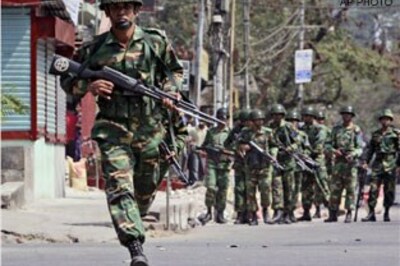
views
Is the India-Italy rift set to get wider? M K Bhadrakumar, former diplomat and foreign policy expert shared his perspective with IBNLive readers for an interaction on the issue.
Q. Does the Vienna Convention provide that a diplomat committing a criminal act within the meanings of the laws of foreign country, he would get immunity from being tried by a Court of Law? Asked by: MLK
A. A waiver of diplomatic community needs to be expressly given by the country concerned before its diplomat is tried in the local court of law.
Q. Does India have every right to arrest the Italian ambassador being a representative of his country ? Asked by: Subramanian
A. Of course, H.E. Ambassador of Italy enjoys diplomatic immunity. He can be "arrested" only if a waiver is given by Rome.
Q. When the Italian ambassador to India retracted from his sovereign guarantee to return the undertrial marines to India, did he break any rules? Asked by: Dhawal
A. The grey area here is that the Italian ambassador acted entirely on behalf of the government of Italy, which is a sovereign country, on instructions. To my mind, he is the instrument of a sovereign state and not a private individual acting willfully in a personal capacity. Equally, the decision not to return the Marines to India was also a decision taken by Rome, which was duly communicated by the Italian Mission in New Delhi through a third person note verbale to the Ministry of External Affairs. Of course, what Italy has done is deemed unacceptable by the Indian government, which is a separate issue.
Q. India is always known to have adhered to "external pressure", so an arrest on the diplomat is never going to happen. Under this situation, what are the other options available for India to bring back the marines? Asked by: Solitary Reaper
A. India has always shown the grit to safeguard its national interests. There was no question of "external pressure" preventing us from liberating Goa or Bangladesh and refusing to join the NTP and the CTBT or the International Criminal Court. That is not the issue here. The arrest of a diplomat without an express waiver from his government will be a gross violation of the Vienna Convention, which will be found unacceptable by the international community. And in any case, as External Affairs Minister Salman Khurshid told the CNN-IBN in an interview over the weekend, India fully abides by the Vienna Convention. Under the circumstances, what can we do to get the Marines back? Good question. It seems to me that we need to work with the Italian government to find an amicable solution, which is also what Rome seems to be seeking and what the European Union has also recommended.
Q. India's act of not letting the Italian ambasador leave the country can have dire consequences over a long term. Will other countries be wary of doing business with India in the future following this fiasco? Asked by: kaushik bhowal
A. To be sure, how India handles this matter is being closely watched by the international community and it has the potential to mar the country's image unless carefully handled. All indications are that the GOI is fully conscious of the repercussions. Having said that, I don't see a precipitate situation having arisen so far, considering that we have not actually restrained the Italian ambassador anyway so far and he has not chosen to travel abroad, either, in the past 72 hours or so. So long as this self-restraint remains on the Italian side, nobody is the wiser as to what the GOI would have done if the Italians had indeed adopted a testy attitude.
Q. Is it not a total arrogance on the part of Italy to refuse to surrender the marines, as agreed earlier? Asked by: Shyam Vadalker
A. We do regard it as a breach of trust, no doubt. Yesterday, the Supreme Court made an observation to this effect. Having said that, however, the problem here is that the Italians seem to have their version too, which of course they are entitled to have. Now, going back to February last year, Kerala government requested that the two Marines should come ashore from their ship in mid-sea for a conversation regarding the circumstances of the alleged killing of the fishermen. They could have refused, but they voluntarily came. And once they were ashore, they were arrested and put in jail. Now, the Italians thought that was a breach of trust on our part.
Q. Sir, in cases of such a rift, how are decisions driven? Does it matter so much on the Minister? Or is much of the negotiation/resolution process driven by Diplomats/officials? Asked by: Rama Krishna
A. In our system, the political leadership takes the decisions and the MEA officials carry out the decisions. There is no question of the foreign policy bureaucracy sidestepping the political leadership.
Q. The Act of the Italian Envoy only shows that he gave the assurance knowing fully well that even if the Marines are not sent back to face the trial in India...as an Envoy he would have diplomatic Immunity.....Why did India nor the SC look through this strategy of Italy...We bundled by letting them off... Asked by: Senthilkumar
A. Indeed, you are one amongst many who keep wondering why the Italian Marines should have been given such a parole for such a purpose as to cast their vote. But then, please remember that there was no case pending in any Indian court against the Marines and the special court is yet to be constituted. They were simply 'undertrials' cooling their heels. And this after their year-long detention in India already.
Q. if the rift remains unsolved and some new govt comes in the next election, what options left for the new govt? Asked by: Anshu
A. It all depends on the status of the case at that point in time.
Q. Why is it that Italy does not come forward with a proposal to conduct a trial in Italy and punish the guilty? Seems like Italy has double standards is quiet evident in a similar case with US? Asked by: Emathew
A. No, this is not correct. There is a case pending in the Italian court on the two Marines for their alleged criminal act.
Q. Hypothetical Question, Sir. If the same episode (right from shooting in the ocean off the South-western coast to now..) had to unwind between US (instead of India) and Italy, what may have been the difference in approach? Asked by: Rama Krishna
A. More to the point, a similar case involving the US Navy killing two Indians in Dubai did arise. Neither you nor I hear anything about it, do we? I was hoping our PM would raise this issue with the UAE leadership at the highest level, but then, PM has since cancelled his visit to the UAE. The point is, like a financial controller in the government once told me, tell me your name and I'll show you the rules. The NATO bombed the Chinese embassy in Belgrade during the Kosovo War, but nothing happened. But if it were a matter between the US and Italy, they have NATO framework to consider. Both are NATO allies.
Q. Lastly, have there been any precedents from anywhere in the world of such (or similar) case? Asked by: Rama Krishna
A. Not that I can recollect. Even former EAM Natwar Singh who has a long memory and rich experience said the same.
Q. Since 26/11 all the fishing boats were supposed to have GPS and their locations monitored. Why is it not possible for the Coast Guard or Navy to alert the fishermen that they were outside the Indian waters? Asked by: Emathew
A. We are nowhere near having worked out such sophisticated arrangements. I heard that the Kerala government has just issued an advisory to all fishermen to keep a safe distance from all ships. That's more like it. Besides, as you know, fishermen go where the fish is. It could be in Sri Lankan waters, for instance, but they couldn't care less and there are repercussions, as we see frequently. The stark realities of life in the impoverished fishing communities need to be taken into account. I don't think it is a mere matter of the availability of GPS.
Q. Why is it that the envoy who had given an undertaking not hold on to his word? After all a man is as good as his word. If he is not able to keep his word, then is it not better to refrain from giving one? Asked by: Emathew
A. Let us not take it personally. As I explained, the Italian ambassador is the representative of his government and acts purely on the basis of instructions from Rome. He is an instrument of state policy. Period.
Q. Is there a need for the world to look at Vienna Convention laws with regards to criminal cases? The fact that the diplomatic immunity is used as a cover for officials to continue to commit and harbor criminal elements, has increased. Asked by: Emathew
A. This is a Pandora's box and unless someone could think of something better - and could work out a consensus in the United Nations in favour of a new charter guiding the conduct of diplomatic business - it stays. To my mind, it stays for good.




















Comments
0 comment